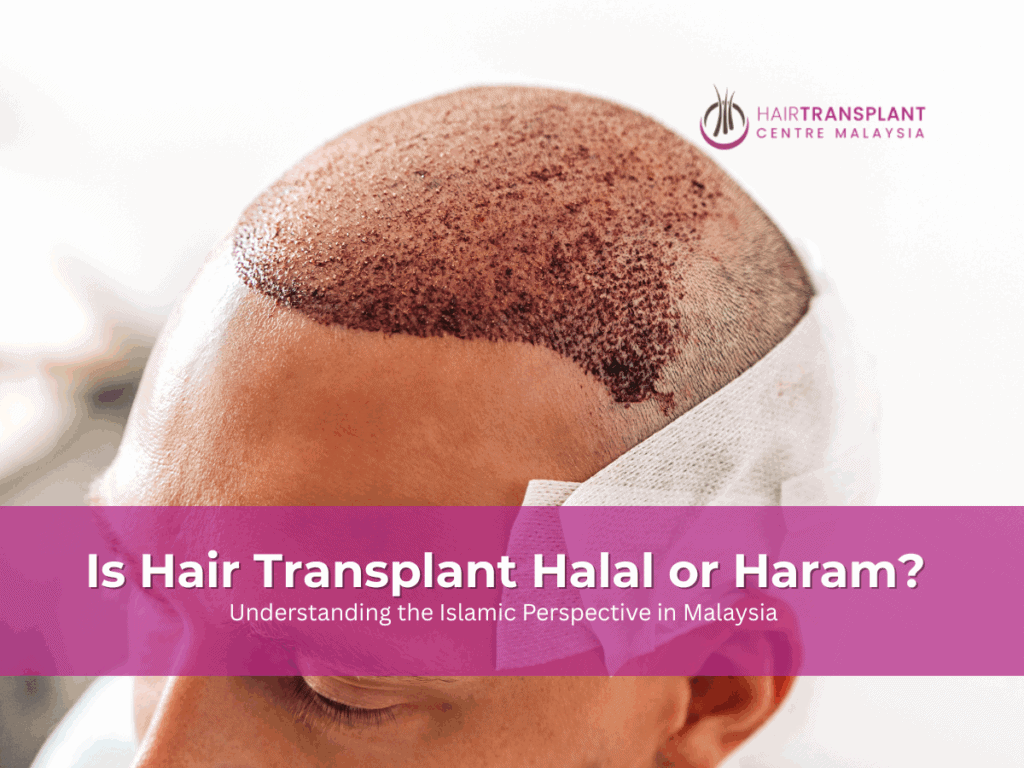Is Hair Transplant Halal or Haram?
For many people, hair loss can be a source of significant distress, affecting self-esteem and confidence. Modern medicine offers a lasting solution: the hair transplant. However, for many Muslims in Malaysia, a crucial question arises before considering the procedure: “Is Hair Transplant Halal or Haram? “
It’s a valid and important question. As Muslims, we are guided by principles that govern all aspects of our lives, including medical treatments. We’re often taught about the prohibition of “taghyir khalqillah” (changing God’s creation).
So, where does a hair transplant fit in? Let’s explore the Islamic viewpoint, particularly the one prevalent in Malaysia.
Let us call you

The Short Answer: Yes, It Is Widely Considered Halal
The consensus among the vast majority of Islamic scholars and major fatwa bodies, including those in Malaysia, is that a hair transplant is harus (permissible).
The reasoning rests on a key distinction: is the procedure an alteration of creation for purely cosmetic vanity, or is it a treatment to restore what was lost?
Treatment vs. Alteration: The Key Principle
In Islam, there is a clear prohibition against permanent, purely cosmetic changes that alter the body God gave us (e.g., tattooing).
However, Islam also strongly encourages seeking cures and treatments (‘ilaj) for ailments, defects, or injuries. The Prophet Muhammad (PBUH) said, “Allah has not sent down a disease except that He has also sent down its cure.” (Sahih al-Bukhari)
Most scholars, including the Wilayah Persekutuan Mufti’s Office in Malaysia, classify significant hair loss or baldness (especially when it occurs prematurely) not as a natural feature, but as a “defect” or “ailment” (‘aib).
Therefore, a hair transplant is not seen as changing God’s creation. Instead, it is viewed as a restorative treatment—much like skin grafting for a burn victim or reconstructive surgery after an accident. It is about restoring hair that was once there, thereby alleviating the distress caused by its loss.
The Conditions That Make It Halal
This permissibility is not absolute; it depends on specific conditions being met. For a hair transplant to be considered halal, it must:
Use Your Own Hair (Autologous Transplant) The procedure must involve transplanting hair follicles from one part of your own body (like the back or sides of your head) to the balding area. Using the hair of another person (living or dead) or artificial/synthetic hair is generally not permitted. Modern FUE and FUT procedures adhere to this by using only the patient’s own donor hair.
Be for Treatment, Not Vain Beautification The intention (niyyah) matters. The procedure should be to treat a clear condition—like male pattern baldness, thinning, or hair loss from an injury—and to restore your natural appearance and confidence. It is not for vain purposes, such as trying to change the natural texture or hairline you were born with.
Be Medically Safe and Necessary The procedure must be performed by a qualified medical professional and be deemed safe, with benefits that outweigh the potential risks. This aligns with the Islamic principle of “do not cause harm” (la dharar wa la dhirar).
What About Wudhu (Ablution) and Ghusl?
This is another common concern, but one that is easily answered. A hair transplant is not like a wig or hairpiece that covers the skin.
The transplanted hair becomes a permanent, natural part of your body. The follicles are placed into your scalp, and the hair grows from it just like any other hair. It does not obstruct water from reaching the skin of your scalp during wudhu or ghusl (ritual bath). You can wash it, cut it, and treat it as your own natural hair, because it is your own natural hair.
Conclusion: A Permissible Path to Restored Confidence
For Muslims in Malaysia facing hair loss, you can have peace of mind. Based on the rulings of established Islamic authorities, a hair transplant is a permissible (harus) medical procedure, provided it uses your own hair and is done to treat the condition of hair loss.
It is not an act of vanity, but an act of restoration and self-care.
If you are considering this step, your faith does not have to be a barrier. We encourage you to seek a confidential consultation with our qualified medical team. We are here to answer all your questions—both medical and personal—with the respect and understanding you deserve.


